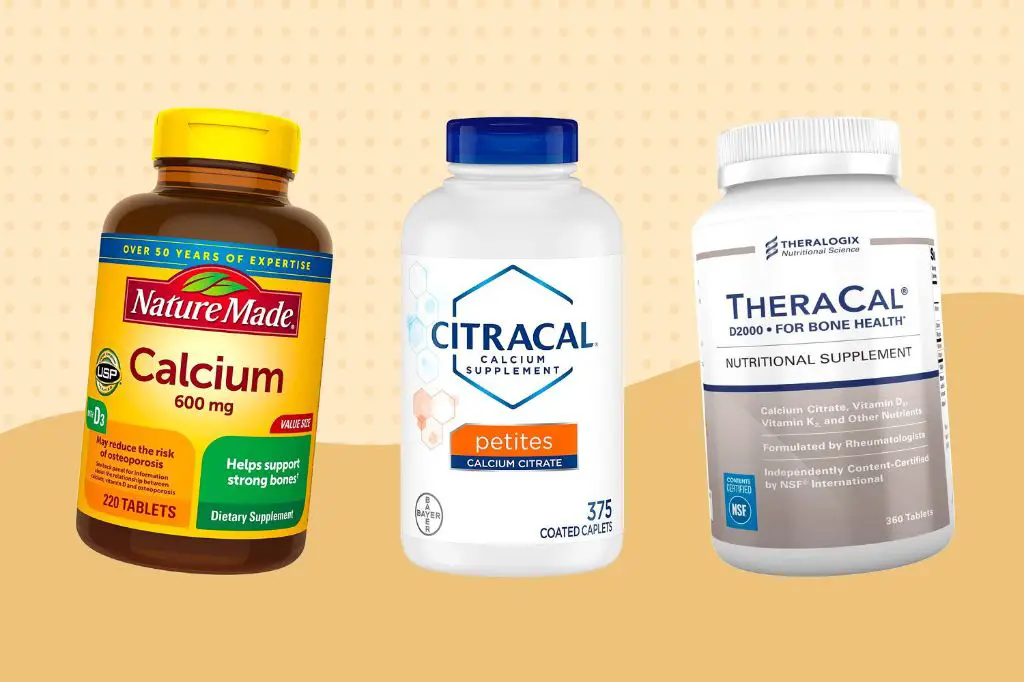Is Tricalcium Phosphate Good For You?
What is Tricalcium Phosphate?
Tricalcium phosphate, also known as tribasic calcium phosphate, is a calcium salt made up of calcium and phosphate with the chemical formula Ca3(PO4)2 (1). It is commonly used as a food additive, nutritional supplement, and component of toothpaste.
Tricalcium phosphate serves as an anti-caking agent in foods, preventing ingredients from sticking together. It is also used as a nutritional calcium supplement, as it provides calcium and phosphorus for bone health (2). Additionally, tricalcium phosphate is a key component of many toothpastes, as it helps remove plaque and whiten teeth (3).
Tricalcium phosphate occurs naturally in cow’s milk and is also found in bones. It is what gives bones their rigidity and strength (1).
Sources:
(1) https://en.wikipedia.org/wiki/Tricalcium_phosphate
(2) https://www.healthline.com/health/food-nutrition/what-is-tricalcium-phosphate
(3) https://www.verywellhealth.com/tricalcium-phosphate-5088859
Safety and Regulation
Tricalcium phosphate is generally recognized as safe (GRAS) by the U.S. Food and Drug Administration (FDA) when used in accordance with Good Manufacturing Practice [1]. This means it is approved as a food additive for human consumption.
The FDA sets an upper tolerable intake level (UL) for tricalcium phosphate at 3.8 grams per day for children aged 1-3 years, and 7 grams per day for adults and children over 4 years old [2]. Exceeding this UL over long periods is not recommended as it may cause adverse health effects.
While allowed in organic foods, tricalcium phosphate must be derived from a naturally occurring source, not synthetic. It also cannot exceed 2% of the total ingredients by weight [3].
Nutritional Benefits
Tricalcium phosphate is commonly used as a nutritional supplement because it is an excellent source of calcium and phosphorus, two minerals that are essential for bone health (Source 1). The main role of tricalcium phosphate in the body is to help build strong bones and teeth by providing these key minerals (Source 2).

Multiple studies have shown that taking tricalcium phosphate supplements on a regular basis can significantly improve bone mineral density, reducing the risk of fractures and osteoporosis, especially in older adults. The extra calcium and phosphorus from tricalcium phosphate is efficiently absorbed and utilized by the body to strengthen and fortify bones (Source 3).
In addition to supplements, tricalcium phosphate is added to many foods like breakfast cereals, yogurt, and plant-based milks as a fortifying agent. This helps boost the calcium and phosphorus content of these foods so that they can better meet daily nutritional requirements for these minerals (Source 1). Overall, the evidence shows that getting adequate amounts of tricalcium phosphate, whether through diet or supplements, has clear benefits for building and maintaining strong, healthy bones.
Potential Risks
Though considered safe in moderation, excessive consumption of tricalcium phosphate may pose some health risks.
One concern is the effect of phosphate additives on kidney health. People with advanced chronic kidney disease need to limit dietary phosphate intake. For them, high levels of phosphate from supplements and processed foods can increase risk of hyperphosphatemia (too much blood phosphate) and cardiovascular disease.1
For healthy individuals, moderate intake of tricalcium phosphate is unlikely to cause issues. But those consuming high amounts from supplements or toothpaste with tricalcium phosphate should have their phosphate levels monitored.1
There are also absorption concerns with tricalcium phosphate compared to calcium from natural sources. One study found calcium carbonate supplements had greater bioavailability than tricalcium phosphate.2 Getting calcium from food rather than supplements when possible is recommended.
Environmental Impact
One of the biggest concerns around phosphate compounds like tricalcium phosphate is their potential environmental impact. High levels of phosphates from fertilizers, detergents, and other sources can lead to nutrient pollution in waterways, causing excessive algae growth and eutrophication (Kim et al. 2013).
However, tricalcium phosphate from sustainable, renewable sources may have less of an environmental impact. Some manufacturers use byproducts from the food industry as raw materials, helping reduce phosphate pollution (Francis et al. 2016). More research is still needed on optimizing sustainable production methods for tricalcium phosphate and reducing its potential environmental risks.
Uses in Food
Tricalcium phosphate is commonly used as an additive in many processed foods. It serves several functions such as preventing caking, adding texture, and fortifying nutrients. Some of the key uses of tricalcium phosphate in food include:
Anti-caking in salts, spices, and baked goods: Tricalcium phosphate has anti-caking properties which prevent table salt, powders, and dry mixes from clumping together. A small amount of tricalcium phosphate is often added to seasonings, baking powder, and other dry ingredients to improve flow and consistency.
Nutrient fortification of cereals, juices, and dairy: Tricalcium phosphate can be used to add calcium and phosphorus to a variety of foods and beverages. Many fortified breakfast cereals, fruit juices, and milk products rely on tricalcium phosphate to boost the calcium content and meet nutrition labeling requirements.
Improves texture and melting properties: In processed cheeses, tricalcium phosphate helps improve the texture and melting properties. It allows the cheese to melt smoothly. In ice cream, it reduces ice crystal formation to create a smoother, creamier product.
Sources:
https://www.ulprospector.com/en/na/Food/Supplements/Detail/1391/59791/Tricalcium-Phosphate-Food-Grade
https://www.verywellhealth.com/tricalcium-phosphate-5088859
Uses in Supplements
Tricalcium phosphate is commonly used in calcium and bone health supplements. It provides a concentrated source of the mineral calcium, which is essential for building and maintaining strong bones and teeth.
Compared to some other forms of calcium supplements like calcium carbonate, tricalcium phosphate has higher bioavailability. This means it is more readily absorbed and utilized by the body [1]. The phosphate component helps transport the calcium across intestinal walls so it can enter the bloodstream.
Several studies have found calcium in tricalcium phosphate is 1.5 to 2 times more bioavailable than calcium carbonate [2]. This allows people to absorb more calcium with a lower dosage.
Tricalcium phosphate may be beneficial for older adults at risk of osteoporosis, postmenopausal women, and others requiring extra calcium intake for bone health.
Uses in Toothpaste
One of the main uses of tricalcium phosphate in toothpaste is as a polishing agent. It works as a gentle abrasive that helps to physically remove plaque and stains from tooth enamel (Tricalcium Phosphate (TCP), n.d.). The gritty texture of tricalcium phosphate provides a polishing effect when brushing your teeth.
In addition to its abrasive properties, tricalcium phosphate also helps remineralize tooth enamel. When teeth are exposed to acids, it can lead to demineralization which softens the enamel. Tricalcium phosphate releases calcium and phosphate ions that can redeposit onto weakened areas of enamel and reinforce the tooth structure (Jackson Ave Dental, 2022). This helps strengthen teeth and prevent cavities.
Multiple clinical studies have shown that toothpastes containing tricalcium phosphate are effective at removing plaque. One study comparing tricalcium phosphate toothpaste to a fluoride-only toothpaste found there was significantly more plaque removal with tricalcium phosphate over a 4 week period (Tri-Calcium Phosphate (TCP), n.d.). This demonstrates the mechanical cleaning benefits of tricalcium phosphate as an ingredient in toothpaste.
Alternatives
There are some alternative calcium supplements and food additives that can be used instead of tricalcium phosphate:
For supplements, other sources of calcium include calcium citrate and calcium carbonate. These are commonly used as alternatives in calcium supplements.
As an anti-caking agent, tricalcium phosphate can be replaced by natural substances like magnesium carbonate, silica, starch, and calcium silicate.
In toothpaste, hydroxyapatite is sometimes used as an alternative source of calcium phosphate.
Overall, there are viable alternative options to tricalcium phosphate in various applications. The choice between tricalcium phosphate and an alternative often comes down to factors like cost, availability, and specific functional needs.
The Bottom Line
Generally, tricalcium phosphate is considered safe for consumption as a food additive and supplement ingredient. However, some potential concerns exist regarding its safety and health effects, especially with long-term use.
It’s important to monitor your intake levels of tricalcium phosphate from all sources and not exceed the established safe upper limits. Consuming very high amounts may lead to risks of hypercalcemia and other negative health effects.
When possible, compare alternatives like calcium citrate which may be easier for the body to absorb. More research is still needed on the long-term impacts of tricalcium phosphate consumption.
In moderation, tricalcium phosphate is likely safe, but it’s wise to be cautious until more definitive research confirms its long-term safety profile. As with any supplement, speak to your doctor before use if you have any concerns.

